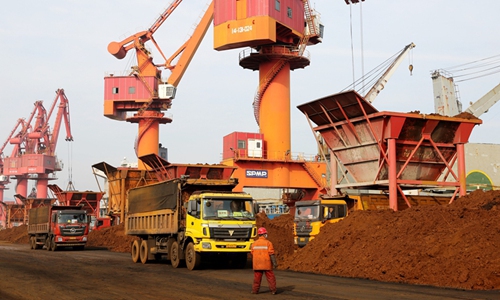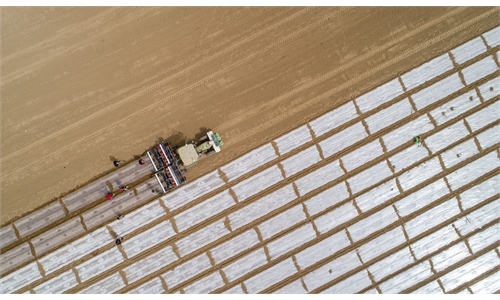COMMENTS / EXPERT ASSESSMENT
Chinese countermeasures surely await Australia in case of import ban

Illustration:Tang Tengfei/GT
In yet another defiant move that might end up threatening its own interests, the Australian Senate on Monday passed a China-targeted bill to ban imports made with what it deems to be "forced labor."
If the bill, presented by independent senator Rex Patrick, were to clear the government-controlled House of Representatives and consequently come into force, Canberra, whose economy is heavily reliant on exports to China, would certainly bear the brunt of countermeasures from China.
The Australian Senate's consideration of such a proposal is another instance of Australia acting in concert with the US to mount a political smear campaign against China. The bill, should it become law, would empower Canberra to crack down on Chinese imports, which is tantamount to single-handedly waging a trade war with China.
A possible scenario could be that garments using cotton from Northwest China's Xinjiang Uygur Autonomous Region may become subject to the import ban and some solar panel projects in Australia with the involvement of Chinese businesses may also be hit.
If that is the case, Beijing will unequivocally respond with necessary countermeasures on terms of equality. The price Canberra has to pay would be unaffordable for an economy increasingly vulnerable to a prolonged disruption in trade with China.
The Australian economy has over the years benefited substantially from its trade surplus with China, Australia's largest two-way trading partner both in goods and services terms that accounts for nearly one-third of Australia's total trade.
Australia's two-way trade with China edged down 3 percent last year to A$245 billion ($176.97 billion), outperforming a 13 percent decline in Australia's global two-way trade. Its goods and services exports to China were down 6 percent year-on-year to A$159 billion in 2020, according to data from the Australian Department of Foreign Affairs and Trade.
The undeniably hefty reliance on the Chinese export market is actually behind mounting concerns over the impact on the Australian economy from disputed Australian exports to China.
Australia's increasing vulnerability to trade measures by China, in any normal setting, should focus the energy of political leaders on maintaining, if not boosting, trade ties with China.
Regrettably and confusingly, the Australian Senate opted to pass a bill that is based entirely on a widely debunked claim of forced labor and that is of no benefit to the country at all.
At the end of the day, a ban on certain Chinese imports on grounds of fictitious forced labor claims would not inflict extra material losses on the target of its most recent attack, while Australian consumers and those trying to accelerate a push toward renewable energy will have to settle for products with higher costs. The Australian economy faces the real risk of being strangled by China's trade countermeasures.
Another bitter consequence of the rash and ill-judged action of political actors in Canberra is the long-term damage being done to the reputation of Australian products and services throughout China's massive consumer economy.
Already, Australia's continued hostility over the past few years toward China has cost its fame as one of the top sources of premium goods for Chinese consumers, an enviable reputation that has built after decades of hard work and good-will within the Chinese market.
If Australia continues to move toward turning its back on its trade ties with China, the country runs the real risk of backing itself right off an economic cliff.
The article was compiled based on an interview with Chen Hong, a professor and director of the Australian Studies Centre, East China Normal University. bizopinion@globaltimes.com.cn



